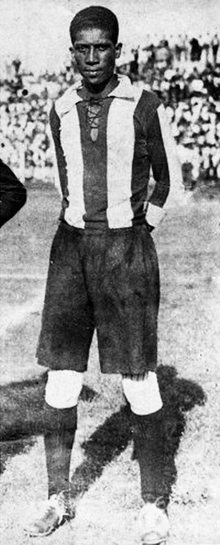Alejandro Villanueva
 | |||||||||||||||||||||||
| Personal information | |||||||||||||||||||||||
|---|---|---|---|---|---|---|---|---|---|---|---|---|---|---|---|---|---|---|---|---|---|---|---|
| Full name | Carlos Alejandro Villanueva Martínez | ||||||||||||||||||||||
| Date of birth | 4 June 1908 | ||||||||||||||||||||||
| Place of birth | Lima, Peru | ||||||||||||||||||||||
| Date of death | 11 April 1944 (aged 35) | ||||||||||||||||||||||
| Height | 1.98 m (6 ft 6 in) | ||||||||||||||||||||||
| Position(s) | Striker | ||||||||||||||||||||||
| Senior career* | |||||||||||||||||||||||
| Years | Team | Apps | (Gls) | ||||||||||||||||||||
| 1926 | Teniente Ruiz | ||||||||||||||||||||||
| 1927–1943 | Alianza Lima | 99 | (71) | ||||||||||||||||||||
| International career‡ | |||||||||||||||||||||||
| 1927–1938 | Peru | 11 | (6) | ||||||||||||||||||||
| Managerial career | |||||||||||||||||||||||
| 1940–1941 | Alianza Lima | ||||||||||||||||||||||
Medal record
| |||||||||||||||||||||||
|
*Club domestic league appearances and goals, correct as of 18 September 2012 ‡ National team caps and goals, correct as of 18 September 2012 | |||||||||||||||||||||||
Carlos Alejandro Villanueva Martínez (4 June 1908 – 11 April 1944) was a Peruvian footballer who played for Alianza Lima and the Peru national football team. He is considered one of the most important Alianza strikers in the 1920s and 1930s.
Club career[edit]
Born in Lima, Peru, started his career at Teniente Ruiz[1] but moved on after a year to the club where he would play the rest of his career, Alianza Lima.
He is known to be Peru's historic bicycle kick figure. Alejandro Villanueva was noted to have an extraordinary handling the football, and his many outrageous moves won him the nickname "Manguera". Among his many exploits, the bicycle kick was one of the moves that won him widespread recognition. While playing for Alianza Lima, Villanueva's fame increased as he made international appearances such as in 1933 when Alianza Lima made a tour in Chile and, with fellow Peruvians such as Teodoro Fernandez, delighted the audiences with his skill and defeated a series of important Chilean clubs of that time such as Club Deportivo Magallanes, Santiago Wanderers, Audax Italiano, and Colo-Colo.[2][3] In Peru, Villanueva is often remembered as one of the finest exponents of that nation's association football and as the player that amazed the crowds with his bicycle kicks. The people of Lima at first thought the bicycle kick was his invention when he executed it in 1928, and commonly called it "tiro caracol". Later, the name changed to "chalaca" when people began to favor the idea that the move was invented in Callao several decades earlier.[4] As a result of these achievements, Villanueva remains a famous figure in Peru to the point that several songs have been made about him and his eternal club, Alianza Lima.
International career[edit]
With the Peru national football team he played at the 1927 and 1937 Copa America, 1930 FIFA World Cup and 1936 Summer Olympics.[5] Villanueva played on the team that won the football tournament at the inaugural Bolivarian Games in 1938.
Death and legacy[edit]
Villanueva died at the age of 35 after contracting tuberculosis. Alianza Lima's stadium, located in the La Victoria district of Lima, is named after him and is popularly known as "Matute".
Honours[edit]
| Medal record | ||
|---|---|---|
| 1938 Bolivarian Games | NA | |
Club[edit]
- Alianza Lima
- Peruvian League: 1927, 1928, 1931, 1932, 1933
- First tier of the league of Lima and Callao: 1939
Individual[edit]
- Peruvian League's Top Scorer: 1929, 1931
Statistics[edit]
International goals[edit]
- Scores and results table. Peru's goal tally first:
| # | Date | Venue | Opponent | Score | Result | Competition |
|---|---|---|---|---|---|---|
| 1. | 27 November 1927 | Lima, Peru | 1–1 | 1–5 | 1927 Copa America | |
| 2. | 6 August 1936 | Berlin, Germany | 2–0 | 7–3 | 1936 Summer Olympics | |
| 3. | 6 August 1936 | Berlin, Germany | 6–1 | 7–3 | 1936 Summer Olympics | |
| 4. | 8 August 1936 | Berlin, Germany | 2–2 | 4–2 | 1936 Summer Olympics | |
| 5. | 8 August 1936 | Berlin, Germany | 3–2 | 4–2 | 1936 Summer Olympics | |
| 6. | 27 December 1936 | Buenos Aires, Argentina | 2–3 | 2–3 | 1937 Copa America |
References[edit]
- ^ Castro, Roberto. "Alejandro Villanueva: El balón esclavo suyo era". El Club de los 100 (in Spanish). Dechalaca.com. Retrieved 20 September 2012.
- ^ "Historia Blanquiazul: 1921–1960". clubalianzalima.com (in Spanish). Archived from the original on 21 November 2008. Retrieved 2008-08-12.
- ^ "Teodoro 'Lolo' Fernandez". futbolperuano.com (in Spanish). Archived from the original on 11 August 2008. Retrieved 2008-08-12.
- ^ "Alejandro Villanueva". peruan-ita.org (in Spanish). Archived from the original on 28 August 2008. Retrieved 19 August 2008.
- ^ "Alejandro Villanueva". Olympedia. Retrieved 23 September 2021.
External links[edit]
- Alejandro Villanueva at National-Football-Teams.com
- Club Alianza Lima – Villanueva honored in Alianza Lima's official website.
- Alejandro Villanueva at Find a Grave
- 1908 births
- 1944 deaths
- Footballers from Lima
- Men's association football forwards
- Peruvian men's footballers
- Peru men's international footballers
- 1930 FIFA World Cup players
- Footballers at the 1936 Summer Olympics
- Olympic footballers for Peru
- Peruvian Primera División players
- Club Alianza Lima footballers
- 20th-century deaths from tuberculosis
- Tuberculosis deaths in Peru
- Bolivarian Games gold medalists for Peru
- Bolivarian Games medalists in football
